#e.g. one works full and one works part
Explore tagged Tumblr posts
Note
I never understood the sharing bank accounts when you get married 😭😭 especially if it goes shit and ur kind of fucked. Like no thanks. I like my own control of what I earn.
I get why some people do it from a financial perspective (esp if you're not co-habitating) but also! why the fuck are you letting someone else touch your fucking money!!
i moreso understand a savings account (esp a high-yield one) but this idea of creating a money pit..........for what, so you don't have to answer a venmo request?? how do you people BUDGET. i just cannot!!
#the book said that data (kind of) said married couples who shared a bank acct were happier but#tbh we've been cohabitating for nearly 4 years!!#i also understand it more for couples who have different work demands#e.g. one works full and one works part#or one doesn't work#but sorry if i won the lottery tomorrow i'd show up to work on monday.#i like my job#i like to work#it is my goal to always be financially independent#all communique has been redacted for your safety;
2 notes
·
View notes
Text




FEBUWHUMP 2025 PROMPT LIST
this year's prompts were chosen through an open suggestion poll (in which we received over 4,000 prompts) and a subsequent vote, where 5,019 votes were submitted. the top 28 make up the core prompts, and the febuwhump mod's favourites that remain have become the alternates. the first prompt in the 28, "vocal chords", was our number one prompt of the vote, with 1,625 total votes.
i am so insanely excited to see what you all create with these prompts, and i hope they're inspiring enough to trigger a whole month's worth of creativity for you!
as an extra added challenge, some creators will be undertaking another, smaller goal, of including apples in each of their prompt fills as an ode to the wildly popular prompt suggestion of "apples" that didn't make it through to the poll. this is totally optional, but is a good extra challenge if you'd like to take part in it!
if you have any questions, please check out the faq before sending an ask, or skim the blog's previously asked questions to see if your question has already been answered.
please note: notifying the blog of completionist status will happen through a google form released towards the end of febuwhump, and if you are interested in joining the febuwhmp discord server, the link will be available to do so for one week towards the end of january.
full write-up of prompts and rules under the cut:
FEBUWHUMP 2025 PROMPTS:
DAY 1: vocal chords
DAY 2: holding back tears
DAY 3: pinned down
DAY 4: hivemind
DAY 5: not trusting reality
DAY 6: forced to stay awake
DAY 7: alternate timeline self
DAY 8: bleeding out
DAY 9: necromancy
DAY 10: magic exhaustion
DAY 11: demonic possession
DAY 12: used as practice
DAY 13: “i don’t trust anyone else”
DAY 14: becoming the monster
DAY 15: icarus
DAY 16: eaten alive
DAY 17: power instability
DAY 18: living weapon
DAY 19: death wish
DAY 20: “i did good right?”
DAY 21: put on display
DAY 22: “grab the little one”
DAY 23: gunshot wound
DAY 24: forced to beg
DAY 25: bound and gagged
DAY 26: concealing an injury
DAY 27: post-victory collapse
DAY 28: recovery
ALTERNATE PROMPTS:
is there a specific day’s prompt you don’t want to fill? here are ten alternatives you can switch them out for!
ALT 1: major character death
ALT 2: blowtorch
ALT 3: pick who dies
ALT 4: body swap
ALT 5: die a hero
ALT 6: emergency surgery
ALT 7: body horror
ALT 8: on the run
ALT 9: in another life
ALT 10: feeding tube
RULES:
soft rules:
prompts should be answered in the form of whump
creators can produce any kind of media they want
you don't have to complete all the prompts to take part
you can use the prompts after the event ends
you can complete them in tandem with any other event
you can post to any platform you want, however this blog will only be sharing links and prompt fills posted to tumblr
if you want to be featured on the hall of fame, you must inform this blog by the 3rd of march that you have completed all of the days using the provided form
if you have questions, consult the faq before asking
hard rules:
to be a completionist, you must complete all 28 prompts, in order, in whatever medium you want, before the end of the event
(specifically for being featured on the blog)
when uploading febuwhump content to tumblr, please use the tags:
febuwhump (or febuwhump2025)
the relevant day's tag e.g. febuwhumpday1, febuwhumpday2...
nsfw (if relevant)
any important trigger warnings
you can also tag the blog: @febuwhump
I cannot guarantee your work will be archived on the blog. a random selection of properly tagged works will be reblogged every day of february.
3K notes
·
View notes
Text
Baking Christmas cookies with Sanji 🍪❤️
Summary: Sanji has the cutest idea for a Christmas cookie date. But what happens when he gets too carried away? ~900 words. CW: Smutty/spicy/nsfw since I mentioned he gets... excited... a couple times. Heavy makeout sesh & lots of hands. Pet names (e.g., angel), but no overtly gendered language.

Artwork by @hirakyun13~ (thank you so much for collabing with me!)

A pretty blonde chef with a holiday apron and a pan full of cookies stands in front of you and you can’t help but be distracted. He’s just too cute.
You can’t even pay attention to the pan of cookies because you’re lost in those pretty eyes, mesmerized by that pretty smile, pretty hair, swirly eyebrows, soft skin, sweet lips—“My love?” He snaps you out of the stupor you’re lost in. “My love, did you hear me? What color of icing do you think would look best on these?”
The present moment races back to you—you’re been making cookies with Sanji, Christmas cookies, no less. It’s a cute date idea he proposed to you.
You tell him the colors you have in mind for the icing. The baking tray is covered with two kinds of cookies—gingersnaps and sugar cookies in pretty shapes. They smell heavenly, and they’re going to taste even better (Sanji’s own recipe).
“Fantastic choices, beautiful.” Sanji responds and sets the pan on a cooling rack.
After a few more minutes, you’ve rolled out and shaped another tray full. They go in the oven and Sanji sets the kitchen timer—at least, he thinks he does. He’s too distracted by you, though. When his finger goes to press the ‘start’ button, he misses, but doesn’t realize it. So, the timer doesn’t actually start. You don’t notice, though.
“Now that we’ve got fifteen minutes, what should we do?” He smiles and sidles over to you, a whole two feet, wrapping his arms around you and pulling you towards him.
“You’re looking pretty delicious, gorgeous.” He grins and blushes. He’s about to say something extremely corny. “Even more delicious than the cookies we’re making. I could just eat you up.”
His last few words are broken up by kisses that he peppers on every part of your face. His lips press onto your forehead, your cheeks, your nose, your eyes, and your jaw. Eventually they land on your lips.
Through his smile, he kisses you delicately. You’d think he’s afraid of breaking you. You’ve told him countless times that you’re not made of glass, but no matter how many times you’ve told him, he doesn’t seem to listen.
He smells clean and barely musky, with an overtone (obviously) of cigarettes, coffee, and sugar (from the cookies). It’s a smell that only Sanji could have, a distinct and yummy one. It almost makes your mouth water.
His hands wander. They love to do that. From your waist, they inch downwards. For a few moments, for a few kisses, his hands stay perched on your hips. But then they pass lower and he bends with them. He scoops you up and you’ve got the position memorized. Sanji reaches under your thighs and you hop ever-so slightly.
You’ve memorized the routine—he picks you up and you wrap your legs around him.
Walking a couple of paces over to open counter space, Sanji places you there and your hands come to rest over his shoulders.
His kisses get sloppier. Greedier. Needier. His hands do the same. They snake down to your ass and he grabs rough handfuls. After kneading for a second, Sanji’s lips start to wander, too.
He leaves butterfly-style kisses across your neck, sucking softly for a moment before moving lower to the hollow of your throat, then the slope of your collar bone. He leaves a bite, and his hands inch to your chest.
You can tell that the gentle cook has forgotten that there are cookies in the oven that demand his attention.
As Sanji starts getting more worked up, you can also tell he’s getting hard. He’s so easily worked up like this that it’s endearing.
His hair shifts as he kisses you and his soft strands softly pass over the skin on your forehead. You can feel him slowly rutting his hips into you, and you squeeze him closer to you with your legs.
As his hands creep under the hem of your shirt and trail upwards, he freezes.
It smells like smoke. Like something is on fire.
Sanji’s head whips around to look at the oven and, sure enough, the cookies are burning, bad.
“Fuck!” he exclaims and practically jumps. After a second, he pulls himself together, trying not to be too jarring around you, but you know that if he was alone right now he’d be being a whole lot more dramatic.
Sanji pulls his hands off of you and goes to open the oven—a puff of smoke wafts out and he gets a face-full.
“It looks like the cookies are burnt, gorgeous. I guess I didn’t actually start the timer.”
He’s frowning in the cutest way possible, but it turns into a sweet smile after a second.
“How about we throw these ones away, and we let the first batch keep cooling while we go do something else?”
You nod in agreement to his proposition and hop down from the counter.
As Sanji does away with the burned up, blackened crisps that once were holiday cookies, you watch him attentively. Even the way he moves his hands is graceful and intentional, measured and deliberate.
He turns and gives you a smile when he realizes you’re observing him. “Like what you see, angel?”
When you turn bright red, he takes off his apron and puts it over your head.
“That’s more like it. Now let’s go be distracted together.”

thank u so much for reading and happy holidays!! another reminder that the lovely lovely @hirakyun13 did the art for this and please go check out here page!
here's my masterlist and the holiday event masterlist 🎄 xoxo
#sanji smut#op sanji smut#op smut#op x reader#one piece x reader#one piece reader insert#sanji x reader#sanji x y/n#sanji x you#sanji fluff#one piece smut
481 notes
·
View notes
Text
My zine, 'Label Coining as an Artform', is finally done! Transcript/Image ID underneath (warning: it's long). Printed version in a reblog.
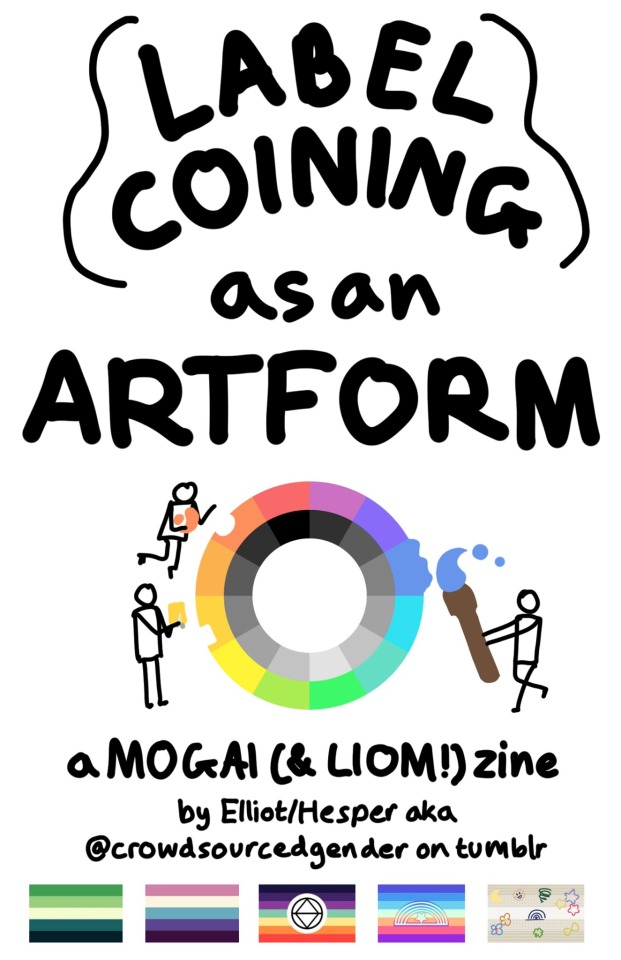
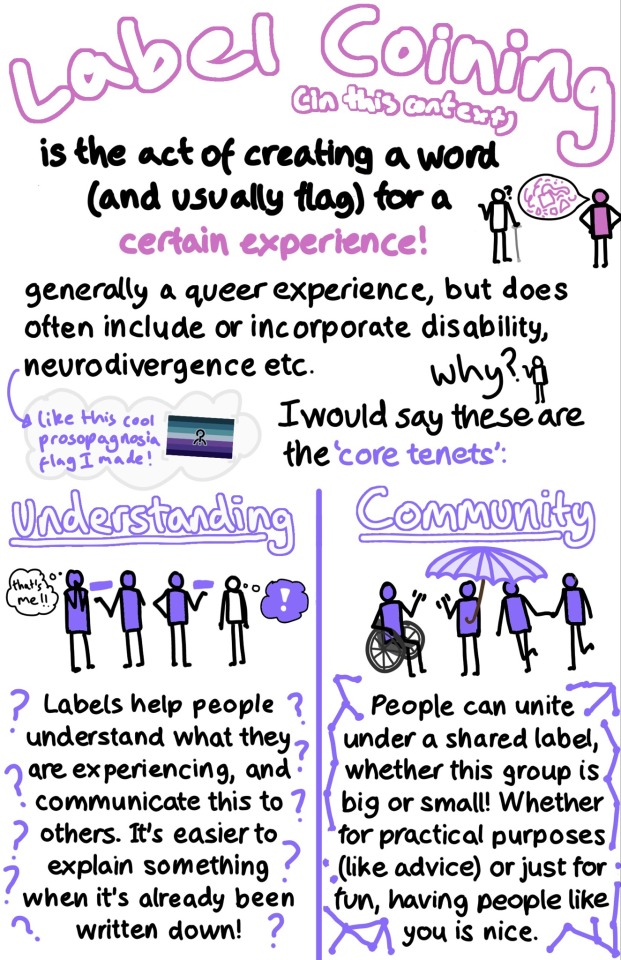
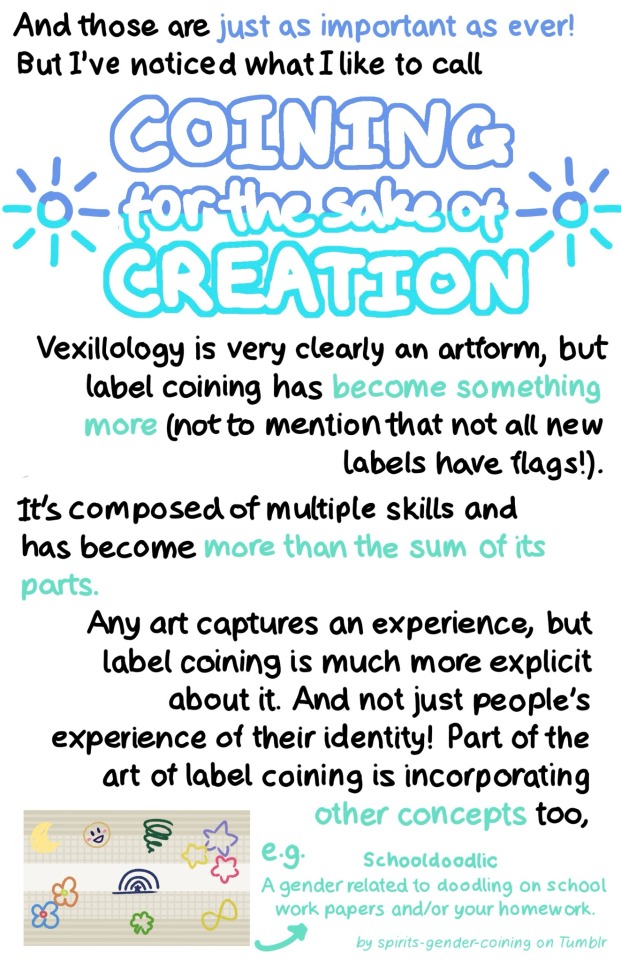
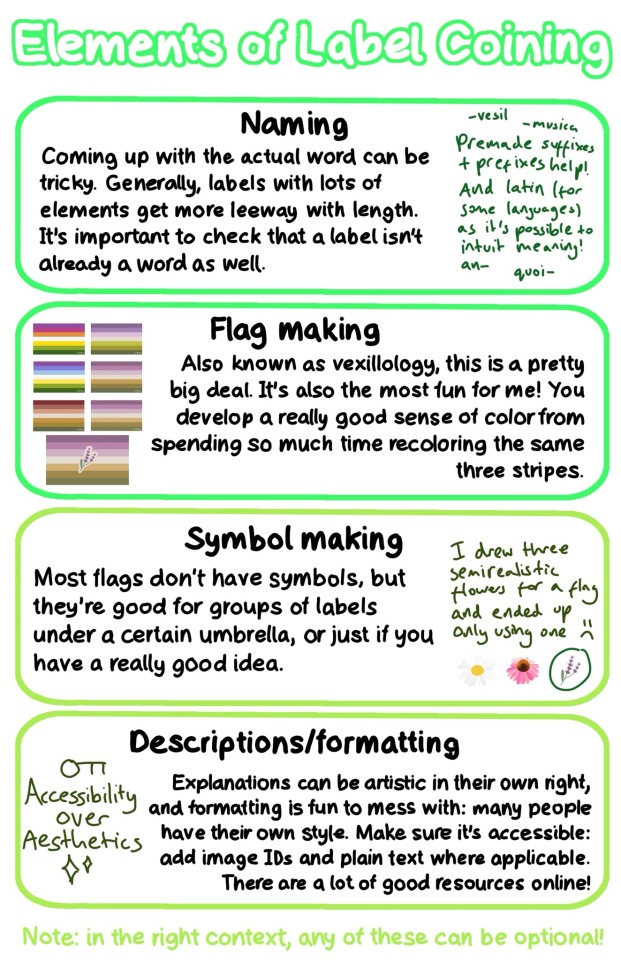
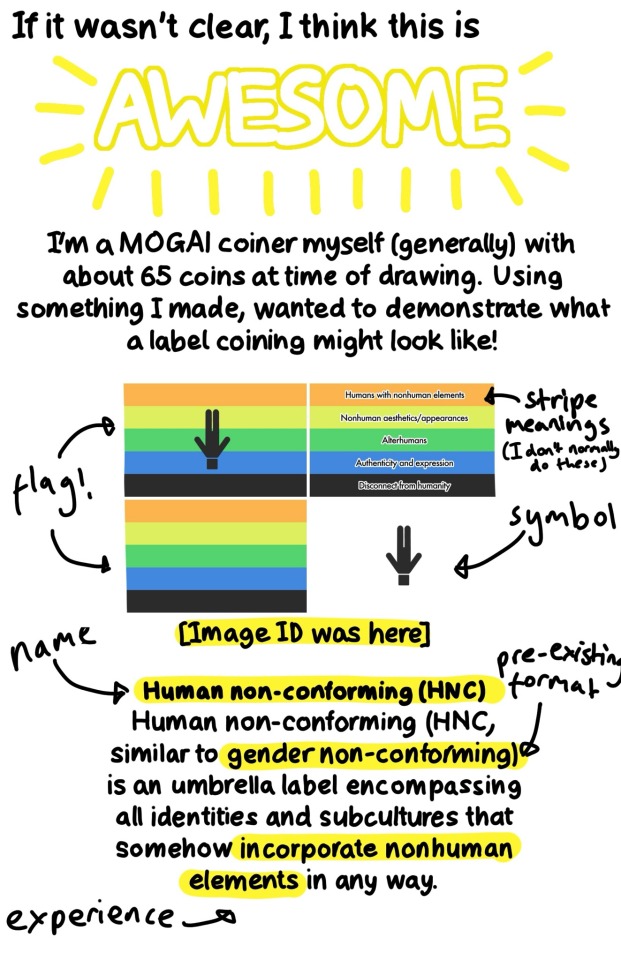
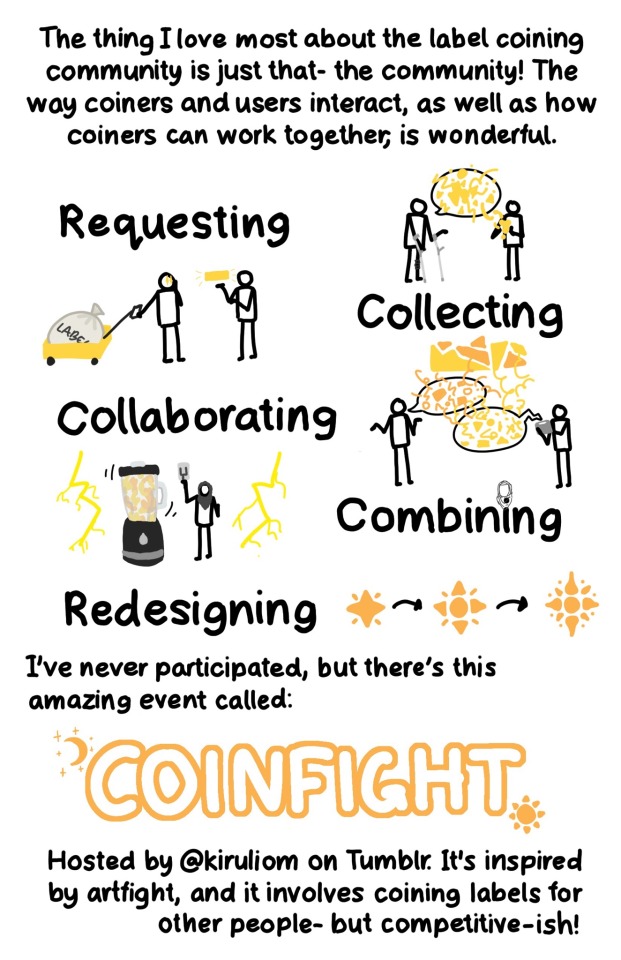
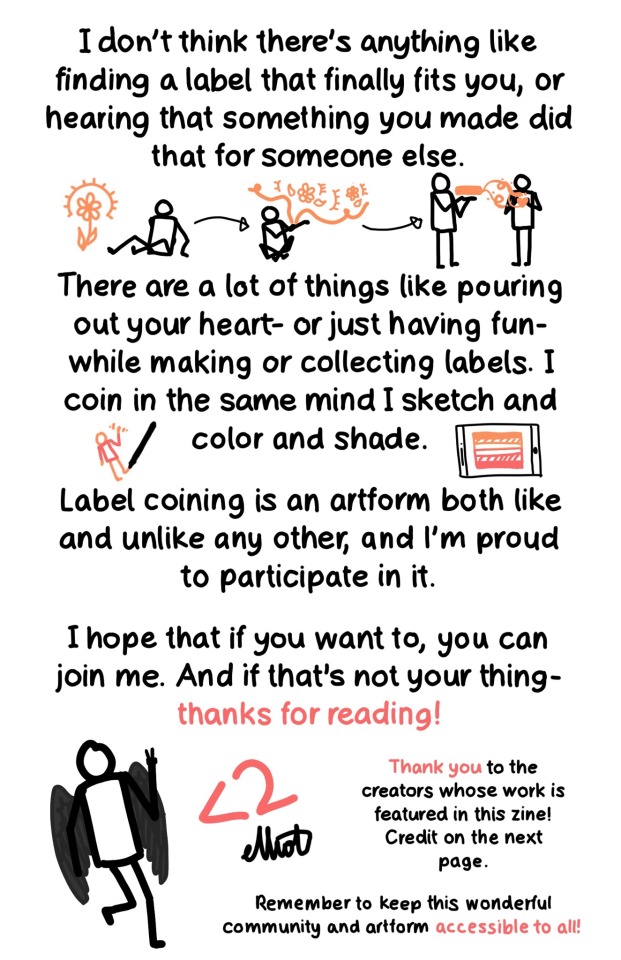
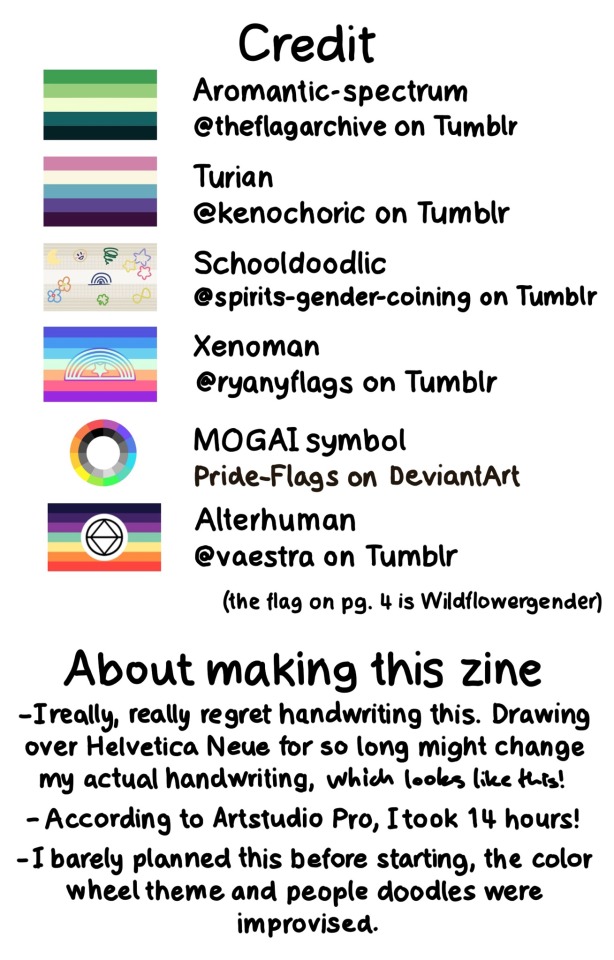

[Image ID: A series of pages in a zine. The text is handwritten, and all figures described are simplified stick figures.
Page 1: ‘LABEL COINING as an ARTFORM in large text. Below is the multicolored MOGAI wheel, with three figures taking pieces of the colors and using them for art: sculpting, cutting a piece of paper, and painting. Below is ‘a MOGAI (& LIOM!) zine by Elliot/Hesper aka @ crowdsourcedgender on tumblr. Under the text are five pride flags: aro-spec, veldian, alterhuman, xenoman, and schooldoodlic.
Page 2: ‘Label Coining’ in large pink text. ‘(in this context) is the act of creating a word (and usually flag) for a certain experience!’. Next to this text is a figure filled in with pink with a speech bubble full of pink shapes, talking to someone using a cane holding out a hand and expressing a question mark. Below reads ‘generally a queer experience, but does often include or incorporate disability, neurodivergence etc.’ A figure asks ‘Why?’ and the text reads ‘I would say these are the ‘core tenets’:’. In a cloud next to this text is a blue and purple pride flag with purple text reading: ‘like this cool prosopagnosia flag I made!’.
The bottom half of the page is split into two columns: ‘Understanding’ and ‘Community’. The first column has a purple arm amputee explaining a purple rectangle to another purple person who is thinking ‘that’s me!!’. Next to them another purple person is explaining the same rectangle to a blank person, who has a purple-filled thought bubble with a white exclamation mark. Underneath the drawing is text surrounded by question marks: ‘Labels help people understand what they are experiencing, and communicate this to others. It’s easier to explain something when it’s already been written down!” The second column has a purple person holding a purple umbrella. They are waving to a purple person in a wheelchair. A purple person is leading another one to the group. Underneath the drawing is text surrounded by connected dots: ‘People can unite under a shared label whether this group is big or small! Whether for practical purposes (like advice) or just for fun, having people like you is nice.
Page 3: ‘And these are just as important as ever! But I’ve noticed what I like to call COINING for the sake of CREATION’. This last phrase is in large, dark and light blue text. Two sun symbols are on either side. Below is the text: ‘Vexillology is very clearly an artform, but label coining has become something more (not to mention that not all new labels have flags!). It’s composed of multiple skills has become more than the sum of its parts. Any art captures an experience, but label coining is much more explicit about it. And not just people’s experience of their identity! Part of the art of label coining is incorporating other concepts too, e.g. Schooldoodlic A gender related to doodling on school work papers and/or your homework. By spirits-gender-coining on Tumblr.’ The text about Schooldoodlic is small and light teal. Next to the text is its flag.
Page 4: ‘Elements of Label Coining’. The text on this page is separated into four green boxes.
‘Naming: Coming up with the actual word can be tricky. Generally, labels with lots of elements get more leeway with length. It’s important to check that a label isn’t already a word as well.’ Next to this text is more rough, dark green text reading ‘Premade suffixes + prefixes help! And latin (for some languages) as it’s possible to intuit meaning!’ Around the text is a few examples: ‘-vesil’ ‘-musica’ ‘an-’ ‘quoi-’
‘Flag making: Also known as vexillology, this is a pretty big deal. It’s also the most fun for me! You develop a really good sense of color from spending so much recoloring the same three stripes.’ Next to the text is 6 versions of the same pride flag, each with slightly different colors, with a 7th final version with a symbol.
‘Symbol making: Most flags don’t have symbols, but they’re good for groups of labels under a certain umbrella, or just if you have a really good idea.’ Next to this is rough, dark green text reading: ‘I drew three semirealistic flowers for a flag and ended up only using one’ with sad face. Under it is a drawing of a daisy, a pink coneflower, and lavender, which is circled.
‘Descriptions/formatting: Explanations can be artistic in their own right, and formatting is fun to mess with: many people have their own style. Make sure it’s accessible: add image IDs and plain text where applicable. There are a lot of good resources online!’ In dark green text is the phrase ‘Accessibility over Aesthetics’ with an image of a key on top and sparkles below.
Underneath the boxes in light green text is ‘Note: in the right context, any of these can be optional!’
Page 5: ‘If it wasn’t clear, I think this is AWESOME’. Awesome is in large text with yellow radiating lines. Underneath is ‘I’m a MOGAI coiner myself (generally) with about 65 coins at time of drawing. Using something I made, I wanted to demonstrate what a label coining might look like!’ Underneath is four versions of the same pride flag as well as a description, with ‘flag!’ ‘stripe meanings (I don’t normally do these)’ ‘symbol’ ‘name’ ‘pre-existing format’ and ‘experience’ labelled. The description reads ‘[Image ID was here] Human non-conforming (HNC). Human non-conforming (HNC, similar to gender non-conforming) is an umbrella label encompassing all identities and subcultures that somehow incorporate nonhuman elements in any way.’
Page 6: ‘The thing I love most about the label coining community is just that- the community! The way coiners and users interact, as well as how coiners can work together, is wonderful. There are 5 large words each with an associated doodle.
‘Requesting’: A figure leaning on forearm crutches has a speech bubble with yellow shapes exploding out of it. Another figure is taking shapes down from the bubble and forming it into a ball.
‘Collecting’: A figure is pulling a yellow cart with a large cloth bag labelled ‘LABELS’. They have stars in their eyes, and are looking at another person who is gesturing to a yellow rectangle.
‘Collaborating’: Two figures, one with orange speech and one with yellow speech and an AAC tablet are discussing, with many shapes and lines intermingling to make a fragmented rectangle.
‘Combining’: A figure in a grey hijab pulls down a lever. They are standing next to a large blender mixing orange and yellow liquids. On either side is bright yellow lightning.
‘Redesiging’: A small star with four radial lines coming out of it becomes more and more complex, indicated by black arrows.
Under the words is the text: ‘I’ve never participated, but there’s this amazing event called: COINFIGHT. Hosted by @ kiruliom on Tumblr. It’s inspired by artfight, and it involves coining labels for other people- but competitive-ish!’ Coinfight is in large, text with a crescent moon with stars at the top right corner, and a star at the bottom left.
Page 7: ‘I don’t think there’s anything like finding a label that finally fits you, or hearing that something you made did that for someone else.’ Under is a figure looking at an orange flower with light lines, then forming elements of the flower into a bubble, then showing an orange rectangle to another figure, with orange tendrils reaching towards them, forming the shape of a heart. Below is the text ‘There are a lot of things like pouring out your heart- or just having fun- while making or collecting label. I coin in the same mind I sketch and color and shade.’ On each side is a pen drawing an orange figure with a red shirt, and a tablet with an orange and red flag. Under this is ‘Label coining is an artform both like and unlike any other, and I’m proud to participate in it. I hope that if you want to, you can join me. And if that’s not your thing- thanks for reading!’ There is a drawing of a figure with dark grey wings holding up two fingers. Next is a ‘<2’ heart and ‘elliot’ as a signature. In smaller text next to these is ‘Thank you to the creators whose work is featured in this zine! Credit on the next page. Remember to keep this wonderful community and artform accessible to all!’
Page 8: ‘Credit’: This section has a pride flag next to each label. ‘Aromantic-spectum, @ theflagarchive on Tumblr. Turian, @ kenochoric on Tumblr. Schooldoodlic, @ spirits-gender-coining on Tumblr. Xenoman, @ ryanyflags on Tumblr. MOGAI symbol, Pride-Flags on DeviantArt. Alterhuman, @ vaestra on Tumblr. (the flag on pg. 4 is Wildflowergender). ‘About making this zine’: ‘I really, really regret handwriting this. Drawing over Helvetica Neue for so long might change my actual handwriting, [more rough:] which looks like this! According to Artstudio Pro, I took 14 hours! I barely planned this before starting, the color wheel theme and the people doodles. /End ID]
#mogai#microlabels#mogai coining#lgbtq#lgbtqia#zine#art zine#lgbtq zine#queer zine#label coining#queer vexillology#queer#queer community#long post#described#image described#image id#not coining
679 notes
·
View notes
Text
Black History Month
To celebrate Black History Month in February, Interact-IF is bringing back one of its beloved events, spotlighting black authors and their interactive fiction projects!
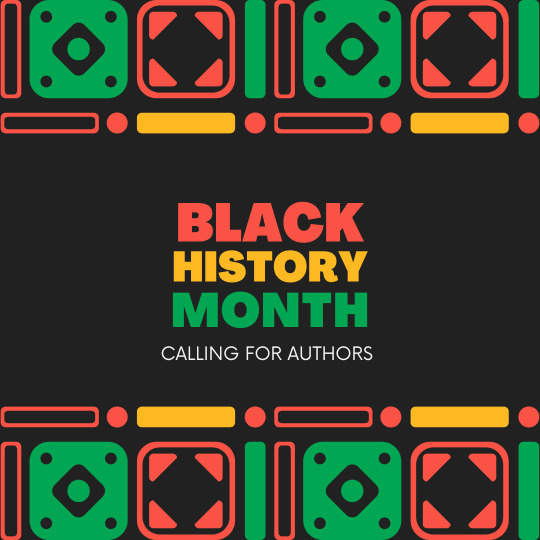
We will feature a masterlist of interaction fiction written by black authors, and select a few to interview about their experiences and creative process! The interview will be done fully via a text Q&A format.
If you wish to be featured (whether in the masterlist or the extended interview), do fill out this google form. Or, if you prefer, you could drop me, @allieebobo a message or an email at [email protected] with the following information:
Name
Background/About you
Game(s)/Projects
A link to the game(s)/IF/intro post
A short blurb/description of the game(s)
Genre/Tags
(Optional) If your writing or experience has been shaped by your identity in any way, feel free to share more here as well :)
Contact information (or how you’d like me to reply/contact you)
Do drop me a DM if you have any questions! Note that interactive fiction is not limited to Choicescript — if you’re an author who uses a different coding language/platform (e.g. ren’py, twine) please know you are very welcome!
Note: If you would like to be part of the extended interview feature, it would be awesome if you could fill out the optional question as well in your message! I'll contact selected authors by email/DM by the end of the month with a full set of questions that you can type out replies to, and send back to me via email. I’ll try to feature everyone who’s interested, but will discuss further if for whatever reason I am unable to feature everyone who reached out.
P.S. If you know any authors who you’d wish to see featured, feel free to share this post with them or @ them when reblogging :)
Check out the 2022 edition below!
#interactive fiction#feature#interview#event#black history month#black authors#choicescript#twine#visual novels#author features
239 notes
·
View notes
Text
I have some thoughts about Nam-gyu’s character (how he comes across to me) because none of the ways I’ve seen people on here characterize him 100% resonate with me. Here are my thoughts on him, and some of these are just speculation on my part:
• He doesn’t like feeling out of control or helpless in any way. I think he has a complex about seeming “weak” and gets really set off if anything seems to confirm that he might appear weak.
• Has some self-hatred but would never admit it.
• Full of resentment (again, he would never admit that)
• Two-faced, tends to act polite/suck up to people who seem stronger but bullies people who are on the same “level” as him (this probably ties into his job as a club promoter because it would involve him having to appeal to people with more power)
* I think that he doesn’t like people who seem “weak” because he worries that other people might see him that way, especially if those “weak” people get close to him.
* I also think he doesn’t like to get too close to people in general because he’s afraid they won’t stay, either because they’ll die or because they’ll stab him in the back. He’s fine acting friendly on a surface level or having fun with someone while high, but he never acts completely genuine and tries not to get attached.
• I think he seems worried that other people look down on him (e.g. when he kills se-mi he asks her if she thinks he’s a joke)
• Is clearly terrified of the games but doesn’t want anyone to know that (hence him relying on the drugs)
* The only person that he seems somewhat comfortable with knowing that he’s scared is Thanos. I think it’s because he’s at least willing to admit that Thanos is stronger than him if it means he can rely on Thanos (it gives him a sense of security). Also he knows admitting it to Thanos might help him get the drugs, which will make it easier to suppress his fear and thus survive. It also might be a bit easier for him because he knew Thanos before the games.
* His total 180 to everyone else after getting the drugs (acting all confident in front of Min-su) shows how unwilling he is to show fear in front of most people. The fact that Se-mi calls him out on it really sets him off and I think that’s what leads to him resenting her so much, because she sees through the facade he tries to put up.
• Says that he did all kinds of crazy stuff when he worked at the club, which makes me wonder a lot of things, like is that how he started using? Did he use to hide how that job made him feel? Did he use to make it easier to put up a front?
• I can’t help but wonder if a small part of him was slightly worried about Gyeong-su during Mingle. Obviously it wasn’t enough for him to really hesitate or anything but when he gets into a room safely he’s the one who looks out the window (which I don’t think he does in any other round of Mingle) and he gets snappy when Min-su asks him about Gyeong-su.
• I think he simultaneously admires and resents Thanos. I think he envies the way Thanos seems so carefree and sure of himself as well as the fame and influence that Thanos has. I also think that while he meant to just use Thanos for security, he ends up getting attached to Thanos and doesn’t really realize it until Thanos is dead. He still feels resentful toward Thanos and tries to convince himself that it’s all he feels, though.
* It’s so hard to describe how I think he felt about Thanos but none of the takes I’ve seen so far have really reflected how I think he felt. I don’t think the reason he hated Min-su and Se-mi were because of jealously stemming from an attraction to Thanos. I think he hated those two because if Thanos paid more attention to them, that would make him feel weaker or less important than them and worsen the weird inferiority complex that I think he has. So he’s jealous in the sense that he feels like he has to compete with them for second place. Side note: I also think he hated them because them voting X showed that he wasn’t skilled enough to manipulate or intimidate them into doing what he wanted them to.
* I also think at first he was desperate to stay by Thanos so he wouldn’t be alone in the games. Since he already knew Thanos from working at the club and he could bond with Thanos over their shared hatred of 333 he had his foot in the door to become Thanos’s ally, but seeing the number of players who are fans of Thanos (and later seeing Thanos gravitate toward Min-su and Se-mi) makes Nam-gyu anxious that he might get left out or forgotten. He knows that Thanos is a strong player, and if he can’t be the strongest, he at least wants to be the second strongest.
* I think he’s really shaken after Thanos’s death and doesn’t completely understand why, which only bothers him more. On the one hand, he doesn’t have to feel inferior to Thanos anymore, but now he’s alone. Min-su and Se-mi are on the X side (and he never really liked either of them much anyway) and the one person he was able to have fun with is dead. When he takes the drugs with Thanos, he tends to goof around more, but when he takes them alone after Thanos dies, he’s aggressive and unhinged, and I think that shows that losing Thanos
• I think he tends to be touchy with other people in order to get them to do what he wants them to. Nam-gyu tends to be more manipulative and roundabout compared to Thanos (of course he can also be violent and direct at times though), and being touchy is his way of feigning intimacy and trying to get the other person’s guard down.
• This is 100% a headcanon but I think he’s bisexual. I think for a long time he assumed he couldn’t be attracted to men because he was attracted to women and he thought that meant he had to be straight. Then one day he hears about bisexuality and he’s like “ohhhh.” He’s definitely closeted tho.
• Another headcanon of mine is that he’s more of an introvert than he seems. Like he tries very hard to seem energetic and outgoing but on the inside he’s tired of people.
Hopefully this made sense and wasn’t too repetitive lol! Idk I guess I just wanted to share my thoughts on him because the main takes on him that I’ve seen are either “I hate him so much he’s the worst and he didn’t care about Thanos at all” or him just being completely dependent on Thanos (and to be fair, a lot of his characterization does relate to Thanos but I feel like ppl sometimes water down his character just so they can ship him with Thanos if that makes sense. Nothing against that ship btw, I actually like them together!) Basically he’s a silly little guy but he’s also a little fucked up actually.
Here’s a couple of pictures that sum him up in a nutshell (to me):
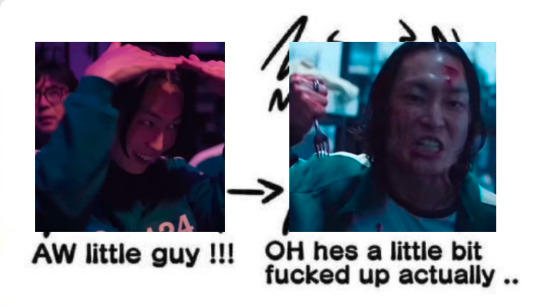
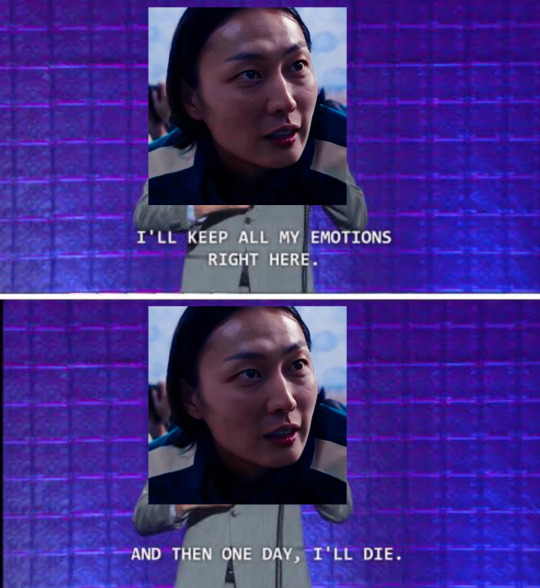
#squid game#nam gyu#nam-gyu#namgyu#thanos (squid game)#choi su bong#choi su-bong#thagyu#thangyu#just tagging that ship bc this kinda mentions my thoughts on them#player 124#player 230
229 notes
·
View notes
Text
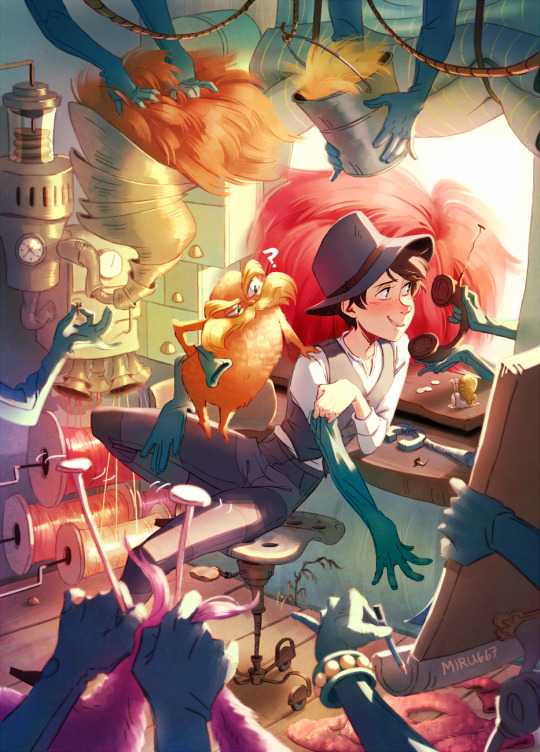
The whole Once-ler family is working full tilt!
Here's my full piece for the VK Onceler Zine! I was very lucky to get to be a part of it...🥹 I used concept art as my inspiration this time: [link] Keep reading below for my process vid and all my director's commentary!
Thank you for being curious! Here's a video of my WIPs:
Deadlines were TIGHT for this zine! We were given only 2 months (compared to the 6 months I had on the previous onceler zine), so to make sure I could finish on time, I decided to do only base colours and lighting, with almost no shading anywhere. Still, trying to balance all the colours took the longest for me, as you can see in the vid. xP
Also idk if anyone noticed, but for the face I chose to use an already existing onceler doodle: [link] Why? Well, why not! I really liked that doodle and I didn't want it to go to waste. 😆
Things that I enjoyed sneaking in:
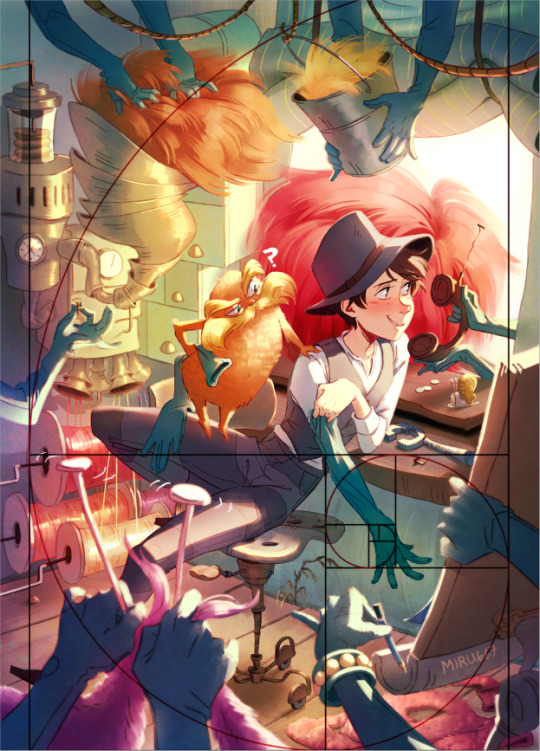
-the golden spiral! Vaguely, at least! At the very least I hope your eyes can follow the order of thneed production, from the fallen tree at the window to the tuft harvesting to the thread spinning, to knitting the thneed and then drawing up plans for bigger and better things, and then ending with him pulling on his iconic glove to show he's going to take control now
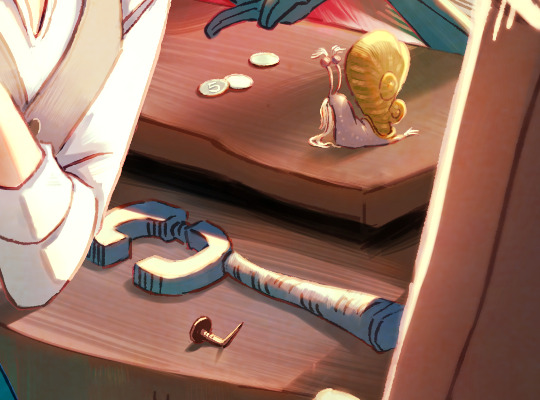
-15 cents, a nail, and a great great great grandfather snail, as well as a tin pail since that's where you're supposed to deposit your payment
-combining things from the 2012 movie and concept art, the 1972 movie, and the 1971 book (e.g. that funny wrench he uses to fix pipes)
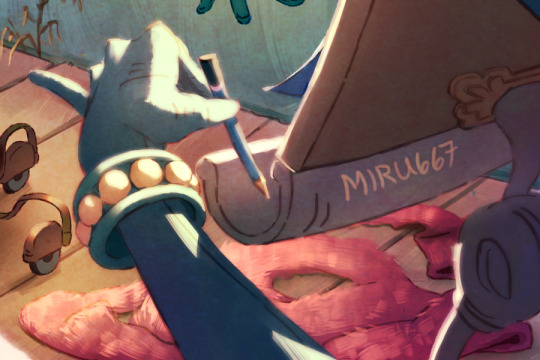
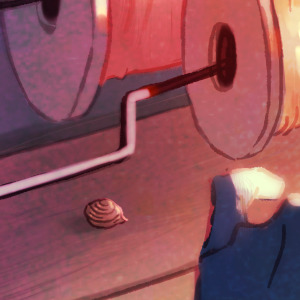
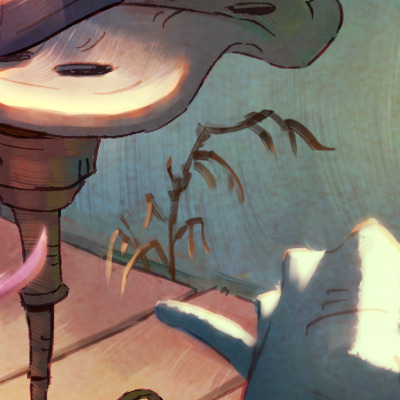
-Miss O'Schmunce-ler! You can see from the vid that I added the bracelet pretty late, because it was a late decision to have a Miss O'Schumunce-ler somewhere. I chose her to be the one picking up the pencil in the end, since she's pretty good with a pencil in the movie hehe. You guys can pretend the arms holding the phone is Miss Funce-ler.
-a thneed, a seed, and a (grickle grass) weed on the floor. The thneed is just the first of many that will soon create a giant pile. The seed lies forgotten in the corner. The weed is foreshadowing the future.
-hinting that Lorax and Once-ler were actually good friends, like they were in the Lorax musical stageplay. 🥺 I kept this part of the script in my mind for this piece:
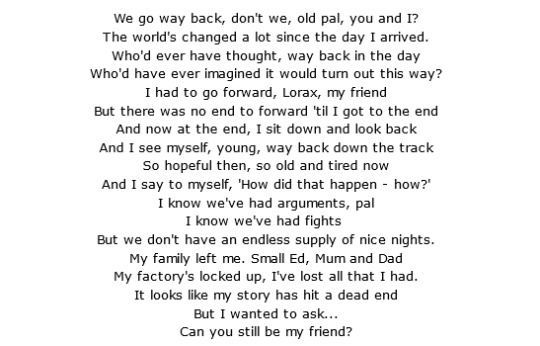
This was aftermath Once-ler talking to the Lorax, reminiscing on their good times...and also being stupid and inconsiderate because the Lorax was in fact there all along as his friend, trying to warn him of what was going to happen. 😔
So in my zine piece we're witnessing a peaceful time before all the real biggering really starts. I like to think that in this scene, the Lorax had been sitting on the Once-ler's lap, holding his gloves for him and having a nice chat together with maybe some harmless bickering, but then the Once-ler gets a phone call so he cuts their convo short and rolls his chair over to the window to answer it. Putting business over friendship as usual, of course. Inspo for the lap sitting comes from this fanart by Emi that I love: [link]
What else...the parts that I'm proud of the most are the stool (I spent 2 days just drawing this stool), the curtains, the fact that I was able to include every truffula colour, and the Once-ler's pose. I was close to giving up on that pose because I had no idea how to draw it but I'm glad that I tried again. I wanted to show him at ease during a stage in his life that we never got to see much: the happier and more innocent days of his biggering when he only had a small shop. 😊
That's all, I think! Thanks for reading if you did! Once again it was an honour to be part of this zine!!
#onceler zine#miru art#onceler#the lorax#lorax#thneed#artists on tumblr#truffula#truffula tree#truffula trees#zine
770 notes
·
View notes
Text
Writing and drawing amputee characters: Not every amputee wears prosthetics (and that's ok)
Not every amputee wears prosthetics, and not doing so is not a sign that they've "given up".
It's a bit of a trope that I've noticed that when an amputee, leg amputees in particular, don't wear prosthetics in media its often used as a sign that they've given up hope/stopped trying/ are depressed etc. If/when they start feeling better, they'll start wearing their prosthetics again, usually accompanied by triumphant or inspiring music (if it's a movie). The most famous example of this is in Forest Gump, Where Dan spends most of the movie after loosing his legs wishing he'd died instead. He does eventually come around, and him finally moving from his wheelchair to prosthetics is meant to highlight this.
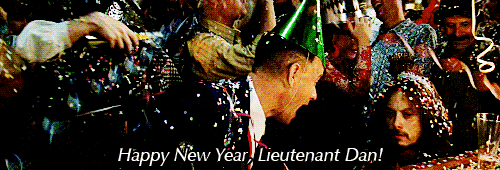
The thing is, it's not that it's unrealistic - in fact my last major mental health spiral was started because one of my prosthetics was being a shit and wouldn't go on properly, despite fitting perfectly at the prosthetist's the day before. I'm not going to use my legs when I'm not in a good headspace, but the problem is, this is the only time non-prosthetic using amputees ever get representation: to show how sad they are. Even if that's not what the creator/writer necessarily intended, audiences will often make that assumption on their own unless you're very careful and intentional about how you frame it, because it's what existing media has taught them to expect.
But there are lots of reasons why someone might not use prosthetics:
they might not need them: this is more common in arm amputees because of how difficult it can be to use arm prosthetic, especially above-elbow prosthetics. Most folks learn how to get on without them pretty well. In fact, most of the arm amputees I know don't have prosthetics, or only have them for specific tasks (e.g. I knew a girl who had a prosthetic hand made specifically for rowing, but that's all she used it for).
Other mobility aids just work better for them: for me, I'm faster, more manoeuvrable and can be out for longer when I'm in my wheelchair than I ever could on my prosthetics. Youtube/tik tok creator Josh Sundquist has said the same thing about his crutches, he just feels better using them than his prosthetic. This isn't the case for everyone of course, but it is for some of us. Especially people with above-knee prosthetics, in my experience.
Other disabilities make them harder to use: Some people are unable to use prosthetics due to other disabilities, or even other amputations. Yeah, as it turns out, a lot of prosthetics are only really designed for single-limb amputees. While they're usable for multi-limb amps, they're much harder to use or they might not be able to access every feature. For example, the prosthetic knee I have has the ability to monitor the walk cycle of the other leg and match it as close as possible - but that only works if you have a full leg on the other side. Likewise, my nan didn't like using her prosthetic, as she had limited movement in her shoulders that meant she physically couldn't move her arms in the right way to get her leg on without help.
Prosthetics are expensive in some parts of the world: not everyone can afford a prosthetic. My left prosthetic costs around $5,000 Australian dollars, but my right one (the above knee) cost $125,000AUD. It's the most expensive thing I own that I only got because my country pays for medical equipment for disabled folks. Some places subsidise the cost, but paying 10% of $125,000 is still $12,500. Then in some places, if you don't have insurance, you have to pay for that all by yourself. Even with insurance you still have to pay some of it depending on your cover. Arm prosthetics are even more expensive. Sure, both arms and legs do have cheaper options available, but they're often extremely difficult to use. You get what you pay for.
they aren't suitable for every type of environment: Prosthetics can be finicky and modern ones can be kind of sensitive to the elements. My home town was in a coastal lowland - this means lots of beaches and lots of swamp filled with salty/brackish water. The metals used in prosthetics don't hold up well in those conditions, and so they would rust quicker, I needed to clean them more, I needed to empty sand out of my foot ALL THE TIME (there always seemed to be more. It was like a bag of holding but it was just sand). Some prosthetics can't get wet at all. There were a few amputees who moved to the area when I was older who just didn't bother lol. It wasn't worth the extra effort needed for the maintenance.
People have allergies to the prosthetic material: This is less of a problem in the modern day, but some people are allergic to the materials their prosthetics are made from. You can usually find an alternative but depending on the type of allergy, some people are allergic to the replacements too.
Some people just don't like them.
There's nothing wrong with choosing to go without a prosthetic. There's nothing wrong with deciding they aren't for you. It doesn't make you a failure or sad or anything else. Using or not using prosthetics is a completely morally neutral thing.
Please, if you're writing amputees, consider if a prosthetic really is the best mobility aid for your character and consider having your characters go without, or at least mix it up a bit.
For example, Xari, one of the main characters in my comic, uses prosthetics unsupported and with crutches, and uses a wheelchair. They alternate between them throughout the story.
#disability#disabled#id in alt text#writing#writing disability#disability representation#authors of tumblr#write#writeblr#writers on tumblr#writerscommunity#writer#creative writing#writing tips#writing resources#writing help#writing advice#writing disability with cy cyborg
3K notes
·
View notes
Text
‧₊˚✧ . ˚prongsfoot ‧₊˚✧ . ˚
touch-averse!sirius x touch-starved!james
sirius who experiences a form of nerve pain as a consequence of the cruciatus curse.
sirius who longs to be held the same way he sees james cradle remus’ frail body after a full moon
sirius who can only watch longingly as he wraps him arms around himself tightly as he sleeps to simulate what he believes james would feel like
james who grew up associating love and belonging with physical affection
james who, when nonverbal/upset, can only be soothed through touch (e.g. hugs, hand holding etc.)
james who starts to cry when people hug him when upset, yes because he’s sad, but also because the one person he wishes he could hold/would hold him, can’t.
sirius who one day, after a howler from walburga, climbs hesitantly into james bed and pokes him softly with the tip of his finger.
sirius who whispers softly to james as he turns over if he can try and sleep next to him
james who tries to play it cool but nods his head so viciously that he starts to see stars.
sirius who only smiles shyly as he opens the other end of the duvet, to climb under and lay on the pillow next to james
james who pushes himself as far into the wall as possible, trying for it to not be noticeable so none of his body parts are at risk of touching sirius
sirius who notices but says nothing, he doesn’t want to ruin whatever this is
prongsfoot who fall asleep together, on the farthest sides of the bed from each other
prongsfoot who wake up, limbs completely engulfed in each others, legs on hips, arms around shoulders
sirius drooling onto james collar bone and james snoring into sirius hair.
sirius who wakes up with an unfamiliar weight on his chest but a familiar smell of vanilla body wash wafting through his nose
sirius who tenses in anticipation of the pain who has become his loyal companion.
sirius who tears up when he realizes it’s not there, all he can feel is the sturdy arms of james wrapped around his waist and the warmth of his neck as sirius cuddles closer
james who can only smile softly as he pretends to be asleep as sirius sniffles softly and snuggles into him, james who squeezes him just that bit tighter as they both drift back to sleep
‧₊˚✧ . ˚ ‧₊˚✧ . ˚ ‧₊˚✧ . ˚ ‧₊˚✧ . ˚ ‧₊˚✧ . ˚ ‧₊˚✧ . ˚ ‧₊˚✧ . ˚
[im aware nerve pain does not work like this, im not a medical professional but this is just something i thought could be cute <3]
#juliwrites#marauders#james potter#sirius black#prongsfoot#sirius x james#james x sirius#sirius black x james potter#romantic prongsfoot
194 notes
·
View notes
Text
gsgw thoughts abt ghost stories and work, spoilers up to abt ch 200
it's really interesting to me how faithful gsgw is to its premise, ie "dropped into a ghost story, still gotta work." kse, upon getting dropped into the wiki world, is immediately put to work at daydream. and whenever he gets put into a ghost story, he's somehow caught up in work in some way or another. even the ones more disconnected from his work at daydream/the bureau still incorporate the idea of "work" in some way. to wit:
- brauns tv show arc has kse work but at specifically brauns tv show
- the second theme park visit involves kse becoming the manager of the yellow zone
- the old daydream facilitys main purpose narratively so far seems to be producing potions for kse so he can more effectively clear ghost stories (work). he also gets dream essence from the ghost stories he clears as part of his work. notably its ability to make wish potions (absolve him from work) is removed
- the arm marketplace (and associated marketplaces) are also places where kse obtains items he uses generally for work purposes. there are occasions where its not just for work (e.g. purging of mental contamination) but id argue that all roads lead to more work (no mental contamination = get more dream essence = get better at work). the illusion of free choice.....
- mountain lodge involves a lot of invocations of kse's job, including baek saheon and the constant references towards them being coworkers. also involves kse hiring another employee (the keeper), and features ryu jaekwan, who is there bc of his own job
- pretty much every other ghost story is entered and cleared as part of kse's work at daydream and the bureau
as a result, gsgw sets up a really interesting association betwen ghost stories and work.
gsgw is also notably pretty critical of capitalism and its various workplaces. daydream is obvious, but even the bureau is still pretty toxic as far as workplaces go, considering factors like its one-man clear teams, low pay, and lack of active personnel compared to daydream. the most obvious evidence is how go youngeun, while working at the bureau, still manages to find herself under a shitty boss and dragged around without her input, showing how it really isnt that different from daydream.
hell, even ghost story workplaces arent spared the criticism. at the theme park, kse is still subjected to toxic workplace politics and despite being a manager, still doesnt have full autonomy. he also, before leaving, has to unwillingly tie a part of himself down to the theme park. at brauns tv show, although kse likes what hes doing, hes also not spared constant working hours with no sleep or food and pressure from his boss to act in line.
interestingly enough, too, kse's most major ghost story contaminations are often also in line with "work." the manual contamination involves becoming a teacher at the hangman ghost story. when hes contaminated at the theme park, he specifically attempts to become a "good mascot of the yellow zone." the story usurper cult contaminant takes the form of a daydream janitor and the implication is that hes become an initiate (ie. a worker) in the cult. the fourth floor looky mart contamination is abt becoming an employee at looky mart. not him, but still notable.
the reason i mention this is because the association between work and ghost stories is likely to be very intentional. personally i find this very funny because in a way, gsgw implies that working sucks as much as being a coward in a ghost story. (considering that kse used to work in finance, id also believe that.)
its also really interesting to me in how its horror-based setting also implies this. specifically, in how horror manifests in psychological paranoia that carries over beyond the horrifying experience itself (e.g. kse's nightmares), and also how kse can find himself randomly dropped into a ghost story without warning (mountain lodge, train to tamra). it reflects how toxic workplaces follow someone outside of the workplace itself. not just always being on call, but also the stress and lack of joy those kinds of things can put someone under that negatively impacts them outside of work itself.
this association reframes kse's desire to leave as not only the desire to leave the ghost stories behind, but to also return to a life without the stress of an unhealthy work environment. but of course we know that even without ghost stories, toxic workplaces are still commonplace. we see this in every place that kse's worked at, where the horror of the workplace doesnt just lie in the ghost story association, but also in mundane factors, like weird hours, scummy bosses, toxic politics, dead-end positions, and high-stress environments. kse's shitty mental state isn't from ghost stories but rather absurd demands from his dictator-like boss who has total control over not only his life, but the lives of the people he cares about.
he even finds comfort in a ghost story bc the way the world narrows to living or dying is a break from the mental pressures at work. really loving the implication that work sucks MORE than nearly dying to a cult. baek deoksoo you will always be legendary for this
anyway the point im trying to make is that bro is NOT leaving behind the ghost stories. if you get dropped in the ghost story you work and its starting to seem like if you work youre basically in a ghost story rip to kse but your cowardly ass is NOT escaping the Horrors </33
144 notes
·
View notes
Text

Per se. — Lee Jihoon
part of my milestone event

Sent by @shinysobi idk emoji but "I shall worship from distance, slyly attach by estrangement/ The bond that leaves no mark" (mayabono biharini horini) by rabindranath tagore for woozi
may u get 50k more
I’ve been unwell ever since I read the verse and decided to look into the poem. I hope I did justice to both the verse and your ethereal brain 💜 thank you for blessing my inbox, and may we all be witnessed like this someday 🥹 — also, I hope you know, I love you and admire you and respect your hard work. You're the best !!
Genre: Non-idol au, melancholic romance, slice of life, low-key (?) angst, slow burn
Pairing: Jihoon × fem!reader
Content: Yearning, mutual pining, mutual emotional distance, greenhouse fieldwork, university conservation project, nature and plant symbolism (wildflowers, basil, thyme, peonies), botany metaphors, introspective tone, springtime countryside, emotionally suppressed jihoon, reserved love, ceramic charm/flute symbolism, journal confessions, missed timing, no physical romance (but emotionally full), soft goodbye, unsent love letter (?), Tagore-inspired, low-stakes bittersweet romance
Warnings: No explicit content or smut, no violence, no abuse, emotional ache and themes of loneliness, not shown heartbreak, mutual but unfulfilled love, low-key melancholy, bittersweet ending, emotionally guarded characters, implied long-term grief, lingering attachment
Word count: 1,848 words

To that end, he had loved her from afar; a sentinel guarding a bond he had dared not name. Not for lack of courage, per se, but because some things, like wildflowers in an untended garden bloomed better unpicked.
It was early spring in a sleepy town near Gyeongju, where the mountains wore tones of moss and pale jade, and the wind still held the bite of winter in its fragrance. The air trembled with a stillness that usually comes after a war—or before a confession. Jihoon wouldn’t know.

She had keys to the greenhouse they both worked in, dangling on a worn lanyard that bore his initials. She always forgot hers. So it goes.
They weren’t lovers, in truth. Not even by definition. Just two volunteers for their university conservation project, tending to heirloom herbs and medicinal plants. Cataloging notes, discussing pollination and drying techniques, sharing thermoses of citron tea, laughing over cafeteria cuisine that never quite hit the mark. But all the while, he loved her.
Brushing dirt off a spade, his fingers grazed hers. Her always so close, so sunlit smile, never stayed long enough for him to catch. Yet she stayed. In between rows of thyme and peonies, beside morning dew, in the warm hush of shared silences.
He watched her with the reverence one saves for a doe crossing an open field, head held high, every step unknowingly sacred. She wasn’t beautiful in the way magazines promised, but in the way old songs whisper: music heard once, remembered evermore. He supposed it was foolish to string unsent messages into constellations and wait for her to look up. But thus, he endured. Perhaps love was made of perseverance more than bravery.
And he was tired. To be clear — not of her. But of everything else, e.g., of carrying this ephemeral ache of guarding an illusion-filled devotion with no place to land. Still, she laughed with him under the sunshine, handed him freshly picked green herbs with fingers stained by soil, and said his name like it meant something.
That was enough. Most days.
-
There were brief, blink-and-you’ll-miss-it moments wherein she’d linger at the edge of his shadow. Say things like, I wish I met you sooner, or You’re easy to be around, you know? Moments all but said, but never quite. Moments where he almost dared to believe she could love him back.
But Jihoon's love was a flute played in secret far from her ears.
A presence like dove feathers: barely there, and fragile as they come. And even if he gave her aught of himself, fully, what justice would it serve? Would it not crush the comfort they built for their own sanity in this insanity?
So he didn’t risk it to give it name, breath, or edges. He loved her not to be loved in return, but to simply love. That was the dream, and if it failed—if she left, or forgot him, or chose another—he’d accept it. He’d grieve quietly, offer her his best wishes, and continue tending to the garden like her footsteps still graced its soil.
He told himself that if he were rejected, it’d be alright. That it’s okay to fail. That even in vain, love had merit.
That perhaps, for what it’s worth, she would carry some trace of him, such as a leaf pressed in a book, the echo of his laugh in twilight. That would be enough.
Likewise, he would carry her scent in spring, her laughter in the sound of wind among trees, and her warmth in the worn ridges of his palm. She would remain—therein, within him. Unnamed, unburned, unbroken.
A bond that left no mark, but lived nonetheless.

Just a semester in the countryside. One research paper, maybe two. Fieldwork, they called it; perseverance in disguise. They didn’t warn you that peace could be so addictive, or that kindness could be silent and still hit. You meet Jihoon there with sunshine through fog—not in a rush, but in a glance that tinged too long. And somehow, his presence grows into ritual.
He always arrives before you with his hands deep in soil or sketching leaves with near-surgical precision with that tension in between his eyebrows. He never talks much unless you speak first. But you always do, because he actually listens, as if your words are okay even when they’re not clever or necessary.
You know, you say one day, brushing a smudge of green off your knuckles, you work like the plants are listening.
They are, Jihoon replies simply, not looking up, as though the earth demanded his full attention and he had no intention of denying it. You just need to speak in their language.
That’s how he is. Always half-afraid to look directly for some reason, always too gentle for a world that values noise over nuance. You don’t mind. In fact, you find comfort in the quiet symmetry of him: the way he tilts his head when you talk about nothing; how he leaves you your favorite tea without needing thanks; how he finds excuses to be near you—yet never too near to be crossing the invisible line he’s drawn and never explains.
There’s femininity in the way you love the world: open arms, open heart. But there’s dignity in the way he does: voiceless admiration, hands kept to himself. And you weirdly still feel it. Every unsaid thing, every thought that lodges behind his teeth and chooses, again and again, not to surface. And so, perhaps because you understand or perhaps because you simply choose to, you keep your own words tucked away too.
Do you think, you ask another day as you both kneel beside wild basil, that it’s possible to be… close to someone, and still not really know them?
He stops picking for a second, I think some people prefer to be known from a distance.
Why?
Because the closer you get, the more likely they’ll fall apart.
You don’t press him and just nod. You’d like to hold his hand, once. Not even in romance; just to prove to yourself the most that he’s real. But it feels like reaching out to touch a dove mid-flight. You’d rather let him fly than risk breaking his wings. So instead, you start writing again in your journal, in the margins of botany books, even on napkins. Words you can’t say to his face, because you, too, are learning the art of loving from afar.
I shall worship from distance, you scribble one night in the dim light of your rented room, slyly attach by estrangement—The bond that leaves no mark. [Mayabono biharini horini…]
And suddenly, you really understand the poem. You love Jihoon, maybe, or maybe you just love the way he makes the world feel slow. But you know this: your connection is real, albeit invisible. A thread spun of shared glances, unsaid words, and tones of silence.
-
You sit together on the edge of the garden as the twilight pulls the shadows long—long enough to make hearts say things they shouldn’t.
“I’m leaving tomorrow,” you let it out into the air.
He just gives you a nod; nothing more.
“Are you… okay?”
“It’s just a change of season,” he says, half-smiling. “Plants survive that.”
“And people?”
“They try.”
You both laugh—sadly. You almost want to say something, but instead, you take a deep breath, and say, “you’ve been kind to me. I’ll miss this. You. Even if we don’t—stay in touch.”
He doesn’t answer for a moment. Then, “Likewise.”
“That’s it?”
“That’s all I can say… without breaking anything.”
That makes you still. So you stand, and place something in his palm; a small flute-shaped charm from the local night market. It's ceramic, fragile. Useless, really. But he’ll understand. “You don’t have to play it,” you murmur. “It’s not for music.”
“Then for what?”
“For what it’s worth,” you say, smiling, “just something to remember the quiet by.”
You lean forward, not a kiss, just the brush of your forehead against his—like justice for all the words you both refused to say. And then you walk away with your keys jingling. You don’t look back, not because you don’t want to, but because the bond never needed a goodbye.

The seasons turn without asking. The twilight comes a little later each day. The basil has gone to seed, the peonies have begun to droop, and she’s been gone… he’s not exactly counting, though, but the space she left behind is precise. It’s in the extra chair by the shed and the missing thermos on the ledge. The silence where her humming used to dance.
Jihoon doesn’t talk about it or tell the new volunteers she used to sit cross-legged on the stone path, whispering stories to the plants as if they were her old friends. He doesn't correct them when they call her that city girl who was always late but always smiling. He just keeps showing up early, just in case.
It’s a tired sort of afternoon as he steps into the old shed brushing dust from the doorknob, and notices something wedged between the loose slats of the workbench drawer. As he leans closer to it, he realises it's a folded piece of paper. A page from her journal, by the feel of it. His fingers hover over it—then go completely still.
He shouldn’t read it. It isn’t fair. It wasn’t meant for him. But thus he reaches, slowly. And unfolds eventually. And there, in her slanted handwriting:
“This is not a love letter. Not per se.
But if it were—
I’d tell you this:
That I loved you like a sunflower loves the sun it cannot reach.
That I saw you even when you wouldn’t let me.
That every moment felt like a memory before it was even over.
I shall worship from distance,
Slyly attach by estrangement—
The bond that leaves no mark.
And I will carry it quietly. Like you always did.”
He lets the paper rest against his chest, closing his eyes. The wind rattles the loose pane, as though urging him to speak. “You knew,” his lips barely moving as he whispers just to himself. “You always knew.”
And perhaps, that’s the only kind of closure people like them get. He walks out into the fading day, the garden humming with dusk. He takes the little flute-shaped charm she gave him from his pocket, still unplayed. He doesn’t play it, but sometimes he presses it to his lips as if it's a promise to her.
Years pass by. He's teaching now and that's botany, of course. Still quiet, still nice. Still too modest for his own good. But some days, someone will mention the word ‘love’ and he’ll look out the window and smile to himself.
He does it not because he’s moved on, but because some bonds do not fade no matter how much you try or want, and he doesn't want that. They simply stop blooming in the light, and remain, therein, like wild roots beneath the surface. Growing. Silent. Eternal. Evermore.

✦ in fiction we trust. love, celeste ˶ᵔ⤙ᵔ˶ You may notice that this piece blends both tense and point of view in a slightly unconventional way — and that was intentional.
The story begins in third person past tense, from his perspective; the love that was. Midway, it shifts into second person present tense to bring you into her inner world; the moment of feeling it directly. The ending then moves into third person present from his perspective, reflecting how some emotions don’t fade with time but that they settle into the present, enduring; the enduring memory and trace.
I chose this structure to mirror how memory works: how we look back, how we feel in the moment, and how some feelings never truly leave us. I never really use dividers in between sections of my fictions, but in this one I did. I felt like otherwise it might be confusing for some readers and decided to also add this note as a clarification of the structure.

⌦ 🕊️ © mylovesstuffs | est. 2025. thank you for reading—your reblog means everything. until we meet again, stay cozy and keep dreaming! ◜ᴗ◝
#svthub#lee jihoon x reader#mylovesstuffs 1k milestone magic 🌙#jihoon x reader#seventeen jihoon#woozi x reader#seventeen woozi x reader#jihoon seventeen#jihoon scenarios#jihoon imagines#woozi imagines#woozi svt#woozi seventeen#svt woozi#seventeen woozi#lee jihoon#seventeen#svt x reader#seventeen x reader#★— mylovesstuffs#★— mylovesstuffs twenty twenty five
69 notes
·
View notes
Text



Finished ref for my new mhs2 oc, Haku and his Abyssal Lagiacrus, Zanka. (Haku isn't in the same world/au? as my other oc Tokyo)
More info under the cut, e.g. backstory, as well as a little bit of info on Zanka.
Will be updating/adding/taking away from this info as I go along, so things may change in this info.
Haku was born in Lulucion (Lamure), and came from a family that had been hunters for generations. (around the age of 11) His family wanted him to become a hunter as well, which he despised, as he considered being a (Royal Paleontology) Scrivener, or possibly a handler for a hunter, rather than hunt monsters he mainly wanted to study them. Haku actually having a fear of monsters, but due to his family couldn’t see himself working a job outside of monsters.
His family were borderline abusive due to their constant push/aggression/etc for him to become a hunter, e.g. getting mad at him if he messed up his training, or getting mad when he was scared of a simple Konchu.
In this time Haku would do several things to try to get out of the house/out of training/etc. He’d often explore ruins around Lamure, and or go out in the fishing boats to help out the fishermen, getting taught how to steer the boats and check for weather and wave conditions/etc.
After a while he learnt about the job of studying ancient ruins/civilizations, having an interest in exploring ruins as he would do that to escape his family. Something to do that didn’t really involve monsters too much, and he could do something he loved. Deciding that's what he wanted to do. But was unsure on how to go about it with his family being around.
Due to a certain incident with Haku and his family he decided to run away from home, stealing one of the fishing boats he used with the fishermen, but due to his rushed nature/panic he didn’t make any checks to see if the conditions were right to sail. He wanted to sail towards the Pomore Garden, as he heard about a Felyne village there and wanted to spend a bit of time away from humans. But due to a storm got swept up and put out near Hakolo Island, which with no other close land in sight/loss of navigation he went towards the island.
When on Hakolo Island he ended up across the island from the village, and lived off the island for a few days hiding from monsters and using his knowledge on plants/etc that he had learnt from his family to live off the land. That is until a scout from Mahana Village found him and took him to the village. Haku was welcomed into the village by most of the villagers. The Chief Gara and Kayna being the only two to hear the full story from Haku. Chief Gara specifically taking Haku under his wing and now raising him.
The villagers found it quite funny Haku’s fear of monsters, but never fully teased him on it, maybe a comment occasionally but left it for the most part. Kayna would often try to get Haku to train to be a rider with her, but Haku for the most part was uninterested. Haku also didn’t like how his movement around the island was restricted by the village, not allowing him to go to certain parts of the island/out far without a monster/permission.
(around the age of 14) Haku snuck out of the village to explore some ruins along a beach on the other side of the island, one where he first landed near when he sailed to the island. And a place he wasn’t really allowed to go now. Wanting to raid the ruins for anything interesting to put into his room. Which after a few random artifacts he came across a kinship stone, and picked it up planning to dump it alongside all the other kinship stones without owners in the village.
But was attacked by a Green Nargacuga, which made him flee and hide, him using the sun and the kinship stone to shine a beam of light from the stone into the Green Nargacuga’s eyes to blind it for a second to get away.
After an hour of hiding he became aware of the tide coming closer to the ruins where he was hiding, knowing if he doesn’t move soon he could possibly be trapped if not killed by the waves.
Deciding then to move, despite hearing the faint signs of the Nargacuga still being around. He would move from ruined building to ruined building. Coming across a building that was fairly open, him seeing something black and bright blue in the corner, curiosity consuming him despite all the danger he was in. Due to how open the area was, the sun was hitting him, and the kinship stone in his hand.
Getting closer he stared at the item confused, the light of the stone shifting and hitting the object which when a crack appeared down the object, which Haku quickly realises what the object is. That object being an egg, and that he has accidentally started to hatch it. Haku being in the situation he’s in now, quickly rushes over to the egg trying to stop it from cracking more saying things like ‘nonono’ and panicking over it. But it being too late and the egg hatching. Revealing a strange looking Lagiacrus, a type he’s never heard about before.
Haku being horrified by it, and then hearing the Nargacuga getting closer as well making him whip his head back and forth from the Lagi to the entrance of the ruined building. Remembering all of Kayna’s talks about looking after their monsters and never giving up on them. Not wanting to abandon a baby he basically forced to hatch he would scoop up the Lagi despite not wanting it close to him he would continue his escape away from both the Nargacuga and the tide of the ocean.
After a while when he got back into the forest he was found by a search party, as he had been gone for too long, and they wanted to find him. He was relieved to see people from the village, but also knew he’d get telling off. Though him having a kinship stone and a baby Lagi in his arms surprised the search party and later the rest of the village.
Chief Gara and a few of the other elders of the village did give him a telling off, but were just glad he was safe. Chief Gara telling Haku what the specific Lagi was and saying it must have washed up in the ruins with another tide, asking Haku what he’d like to do with the baby. Haku still not having put it down yet.
Haku didn’t really want to have any sort of monster, still wanting to one day become a researcher of ancient civilizations. Which Kayna would pipe up, having been listening in on the scolding/talking about the monster, telling Haku that he could use the Lagi to dive and check out the flooded ancient civilizations. That no other researcher will be able to explore to the extent he could with a monster like this.
To which Haku stared at the monster in his arms, the Lagi having its head resting on his shoulder making light cooing noises to Haku.
Haku looking at this monster starts to feel bad about having wanted to ditch it, realising this whole entire time he’s been holding it, it’s never once shifted it’s head, it’s never took its eyes off of him. Kayna also makes a compelling argument, it would be nice to explore areas most wouldn’t be able too.
He decided to become a rider, in which Kayna started to train him. Haku also training to hold his breath underwater, as well as get used to the ocean. Starting to go on dives with the Lagi, who he names Zanka. Though they haven’t explored ruins in that time.
Which takes the story to the main events of the game,(Haku being around 15-16) though the protag isn’t Kayna’s first student in this. I also think the protag would be around the age of 14-15 (same goes for Kyle as he is a similar if not same age as main protag)
Haku journeys with the main protag but often splits off to do his own thing half of the time, or may stay back because of Zanka. As Zanka doesn’t really like all the light from the sun, and also wants to be around water.
Haku does go to Lulucion (Lamure) with the protag, as he’s worried about Ratha, plus with the ocean being around Lulucion he knows Zanka will be fine. He purposely hides when moving around Lulucion, and or actively stays out of the city if he can, avoiding his past life. He would have liked to have never returned, but his worry for the protag and Ratha is what makes him go. The protag may realise somethings going on with Haku, but Haku won’t say. Only saying why after the events of the main story.
During the ‘story’ Haku does end up going to the Pomore Gardens with the protag. And sees the destroyed Felyne village. Feeling a little responsible, as that's where he tried to get all those years ago on the fishing boat. Thinking if he actually made it to the village, and seen the place in chaos, he could have sailed back to Lulucion and gotten help for the Felyne’s. He knows its silly to think like that, but can’t help it. While there, he tries to help out the Felyne’s where he can, even helping out with very simple things. From there Haku splits off from the protag for a bit to go finally get help for the Felyne’s from Lulucion/the Scriveners.
When leaving Pomore Gardens he goes with Kyle, since Kyle was heading that way anyway, Haku still not really liking Kyle, but dreads travelling with just his monster. Preferring to travel alongside someone who knows what they're doing in a fight. Though Haku does bother Kyle a bit as he wants to use Zanka to cross the ocean to get to Lulucion quicker, whereas Kyle refuses to get on a monster, let alone get on one that's going to take them out to sea. So they follow the water instead, so Zanka can stay in the water as they travel on land.
When the protag and Haku meet again it’s back on Hakolo Island during the final act of the main story, he had already received a report on things that happened while away. The only one in the Oltura fight looking like he’s about to pass out due to his fear.
_____________________________________________________________
Haku is a relatively strange person, often seeming to flip emotions very quickly, when in reality he’s just dramatic. As a child he was super shy and a bit of a crybaby, but when push came to shove he could do some brave things (though some would argue that it’s not brave it’s stupidity). But after spending time on Hakolo Island he slowly grew into a less shy person, being able to grow in a community that didn’t punish him for failing or getting something wrong, who encourages him to fight for himself to do what he wants to do in life.
He’s become a fairly outspoken person and now not really afraid to say what he wants, though he’s also aware that sometimes he needs to take a step back and realise if he says something hurtful.
He’s dramatic in the way he talks, often enjoying saying over the top things, mainly to help with his own nervousness about a situation. He’s often fairly friendly, but when he doesn’t like someone he lets them know clearly. Often he may get into arguments with people no matter if he’s in the wrong or not.
Haku cares a lot for the main protag, seeing them as a sibling. Went with them to try to look after them, as the protag had never left the island till the main story takes place, is a little less afraid when fighting alongside the protag, fighting on behalf of the protag.
He’s always had a fear of monsters for as long as he can remember, despite not having any traumatic experiences with a monster. Every fight/hunt he’s in he does in fear, but over time in the story his fear somewhat turns into being a cautious fighter and one to notice little changes in a fight. His 3 weapon choices are sword and shield, hunting horn, and gunlance (in mhs2 choices) (if he could pick all weapon types his 3 weapons would be lance with full defensive skills e.g. Guard/Guard up/Offensive Guard, he’d have bow and hunting horn still)
During the story he learns to be less afraid of monsters, and also slowly starts to realise his dream of diving to explore ruins when he gets in contact with the Scriveners in Lulucion (Lamure). He learns to deal with difficult people (e.g. hunters, mainly Kyle).
_____________________________________________________________
Haku’s Abyssal Lagiacrus is called Zanka.
Zanka doesn’t really like being on land and is often found in any source of water it can get himself into. Is like the equivalent of a cat that wants to get into a box but can’t fit, but with water. He also doesn’t like the sun due to Abyssal Lagi’s mainly being in deep ocean so isn’t used to the light, likes the warmth of the sun though. When the group got to Lulucion (Lamure) Zanka tried to get into the water fountain in the middle of the city, even though he won’t be able to fit into it, which Haku grabbed onto him on his tail and tried to drag Zanka back to the stables.
Overtime of being raised by Haku, Zanka has semi picked up on how dramatic Haku can be and sort of acts like Haku. Even not really liking other monsters too much, as Haku is scared of monsters. Or when someone else tells him to do something he will refuse to do it, as it wasn’t Haku telling him. Often when people talk to him, he will flick his head upwards pointing his nose up at the sky and stare down at them from this angle to show he doesn’t like them ‘flick head away in disgust’.
Zanka doesn’t get along with many people, as over the years Haku has become confrontational towards people, which Zanka has picked up as well. Being a lot more critical and judgy towards people. Which isn’t too bad, unless Zanka picks up on the fact Haku doesn’t like someone then Zanka is an ass to that person. E.g. Kyle, will try to bite him or take things from him to throw or run away with, or just grumbles whenever he talks. Even though Haku has chilled out when it comes to Kyle, Zanka is willing to take this one-sided beef to the grave.
Haku has given it a hand command that if shown Zanka will start to screech. Haku does this when someone he doesn’t likes tries to talk to him, he can secretly give Zanka the command, and often scare people off with how loud Zanka is being, or have Zanka screech over the person speaking. Often Haku will have Zanka swim a bit out to sea, and make Zanka have his back out of water, so he can sunbathe on Zanka’s back and Zanka can mostly be in the water, so both of them are happy.
Zanka has headgear that often feature some sort of shade for his eyes. As being a monster that is used to low light/no light things the sun can be annoying if not could even hurt Zanka’s eyes. So Haku has headgear specifically designed for Zanka.
_____________________________________________________________
Haku's possible monster team/teams:
(Gonna try to avoid giving him deviants/elders, but will have a section for if I ever do draw/etc him with more powerful things) Elm = Element of the monster AT = Attack Type of the monster (Haku when picking 3 monsters for a smaller team will pick monsters with different Elm's and AT's)
Must be on team (if its a team of 6): -Abyssal Lagiacrus (Elm: Thunder | AT: Power) (Abysal Lagi isn't in mhs2, but it was in a side mobile mhs game thats now shutdown. mobile game didn't have any AT's so will make them up) (Also if he's choosing a team of 6 he always has Abyssal Lagi in the team, where as if it's a team of 3 he may choose another thunder monster to give his Abyssal Lagi a break)
Can be on main team:
-Stygian Zinogre (Elm: Dragon | Attack Type: Technical) -Legiana (Elm: Ice | AT: Speed) -Mizutsune (Elm: Water | AT: Technical) -White Monoblos (Elm: Non Elm | AT: Power) -Bazelgeuse (Elm: Fire | AT: Speed)
Possibly on team (No particular order):
-Zinogre (Elm:Thunder | AT: Speed) -Brachydios (Elm: Fire | AT: Power) -Zamtrios (Elm: Ice | AT: Technical) -Glavenus (Elm: Fire | AT: Power) -Tobi-Kadachi (Elm: Thunder | AT: Speed) -Fulgur Anjanath (Elm: Thunder | AT: Power) -Palamute (Elm: can be any of the elm Palamute's | AT: Speed) -Shrouded Nerscylla (Elm: Non Elm Haku focused genes on status | AT: Technical) -Espinas: (Elm: Fire (also has a lot of poison/para) | AT: Technical) (Isn't in mhs2, but turning it into a monstie)
Deviants/Elders (No particular order):
-Lucent Nargacuga (Elm: Non but focus on poison status and kinship | AT: Speed) (isn't in mhs2, but it was in a side mobile mhs game thats now shutdown) (can also be Silverwind Nargacuga ((Elm: Non Elm | AT: Speed)) prefer Lucent cause of the poison thou.) -Crimson Glow Valstrax (Elm: Dragon | AT: Speed) (isn't in mhs2, but it was in a side mobile mhs game thats now shutdown) -Oroshi Kirin (Elm: Ice | AT: Speed) -Boltreaver Astalos (Elm: Thunder | AT: Technical) -Bloodbath Diablos (Elm: Non Elm | AT: Power)
_____________________________________________________________
Extra stuff (either about Haku or Zanka/his monster(s)):
-Zanka is a monster Haku has for a few years, before part way through the events of the main story/after the story Haku finally starts to get more monsters. Though he takes his time with each monster he has, but primarily sticks with Zanka
Names of his other monsters and their genders: -Stygian Zinogre = Wrio (M) -Legiana = Virtue (F) -Mizutsune = Sayomi (M) -White Monoblos = Anwar (F) -Bazelgeuse = Enya (F) -Zinogre = ??? (F) -Brachydios = ??? (F) -Zamtrios = Moza (M) -Glavenus = ??? (M) -Tobi-Kadachi = ??? (F) -Fulgur Anjanath = ??? (F) -Palamute = ??? (F) -Shrouded Nerscylla = ??? (F) -Espinas = ??? (M) ____________________________
-Lucent Nargacuga = ??? (F) -Crimson Glow Valstrax = ??? (M) -Oroshi Kirin = ??? (M) -Boltreaver Astalos = ??? (M) -Bloodbath Diablos = ??? (M) (when I get more names for the monsters I will edit)
-Haku doesn’t truly have a fear of monsters. It’s more so the fear of disappointment, messing up. Due to how his family was the fear of his family and upsetting them manifested as a fear of monsters, both because of the ‘becoming a hunter’ aspect, and also the fact he didn’t want to blame his family, so the next best thing to blame is the monsters. A bit after the main story takes place is when Haku finally starts to unpack this information once he realises.
-Haku does have some wyverian within him, but for the most part is human
-Zanka has pink on him, due to having some dragon elemental attack within him, though it's not really used in his moveset.
-
-
-
_____________________________________________________________
Inspo’s:
-Haku shares a name with another oc of mine, though their looks are not similar, their personalities are a little similar.
-Haku’s diving mask is based off of Rudo’s mask (Gachiakuta).

(art by Kei Urana??)
-The comment about Haku’s eyes being able to be drawn wobbly is also in ref to Rudo’s eyes in the manga Gachiakuta.

-The Abyssal Lagiacrus (Zanka) has the name of the character ‘Zanka’ from Gachiakuta.
-An old design I made inspired both his eyes and hair. (won’t post that art here thou)
-Other inspo names for Haku’s other monsters, Stygian Zinogre = Wrio (Wriothesley - Genshin Impact), Zamtrios = Moza (mosasaurus but with a z instead of an s), (will add to when i get more names with inspos)
#art#digital art#digital#sfw#oc#ref#bluez art#oc ref#reference#oc reference#monster hunter#monster hunter stories#monster hunter stories 2#lagiacrus#abyssal lagiacrus#mhs2#mhst2#monhun#mon hun#monster hunter oc#a ton of gachiakuta inspo. I love that manga#monster hunter stories oc#monster hunter stories 2 oc#mhs2 oc#mhst2 oc#lagi
80 notes
·
View notes
Text
What does the pre-Fall scene actually mean?
I’ve been thinking about that first scene, with pre-Fall Crowley. We are all swooning over how sweet and innocent Angel!Crowley is, and how smitten Aziraphale is, but on reflection there is something odd about this scene.
The action takes place before the rebellion, before the Fall, when bad things hadn’t even been invented yet. So why is Aziraphale already worried about Angel!Crowley getting into trouble for asking questions? Shouldn’t he also be a cute innocent bundle of fluff without a care in the world?
There is a meta that examines this (sorry, I can’t find it, I’m useless at this), which comes to the conclusion that Aziraphale later on is suffering from guilt (that he might have unwittingly prompted Crowley to seek answers and hence fall), but this still doesn’t explain why Aziraphale knows that asking questions might be a Bad Idea, and Angel!Crowley doesn’t. After all, Angel!Crowley has apparently been working “very closely with Upstairs”. Shouldn’t he be a bit more clued up?
This leads me to think that there are 2 possible explanations for this.
1. Angel!Crowley has been so far out of things playing with stars that he really is clueless about everything (possible but doesn’t really match up to the Crowley that we know today).
2. This is not a true record of events.
Either: it is one of Aziraphale’s memories, but coloured by what he knows today, so the conversation that actually occurred might have been quite different. Maybe it is because of Aziraphale’s less than perfect recall, or maybe the memory was tweaked (e.g. by the Metatron) to emphasize the innocence of Angel!Crowley and the injustice of his later fall.
Or: IT NEVER EVEN HAPPENED AT ALL. Their true first meeting was as S1, on the walls of Eden, and it is all a false memory planted by the Metatron. (This could also explain why we don’t get to hear Angel!Crowley’s name. It’s not actually known, so can’t be added to the ‘memory’). Why would he do this? It could be to make Aziraphale think that Angel!Crowley was so full of joy that he should be reinstated to recapture that innocence.
There are plenty of theories about the other flashback episodes in the series, all of which could be interpreted as showing off Crowley’s 'good' side, to make the thought of his reinstatement as an angel more plausible or even necessary to right an ancient wrong.
If any or all of this is the Metatron’s doing, what is the motive? He clearly loathes Crowley. Maybe reinstatement as an angel would automatically wipe out his memories of being Crowley and all of his Earthly experience, so you would end up with a cute innocent (and ultimately useless) angel with no memories of his friendship with Aziraphale. Or perhaps it was a way to get him to come up to Heaven where he could be ambushed and imprisoned.
Or maybe the Metatron always knew that the very concept would go down like a lead balloon and that its aim was to make Aziraphale and Crowley part in such a way that they would be less likely to try to contact each other later.
There are so many pieces to this puzzle. Just when I think that a couple might go together I find others that don’t fit with the patterns already made, and which sometimes seem to belong to a different puzzle altogether. I’m sure that I already have 5 corner pieces.
#good omens#aziraphale#crowley#aziraphale x crowley#crowley x aziraphale#good omens 2#neil gaiman#good omens analysis#good omens meta#before the fall#Why is Aziraphale aware of bad things before they were invented#angel crowley#too many questions#good omens theories
1K notes
·
View notes
Text
meandering post about reading Orson Scott Card again
I've been offline starting at 9pm every day (except once. I was drunk at karaoke and asked for anons at 8:30pm) for six weeks, with the result that in befuddled boredom two nights ago I picked up Orson Scott Card's Songmaster from the house bookshelf.
I read Ender's Game and three sequels when I was a teen thought the books were mid. Since those are OSC's best works I assumed he had nothing more interesting to offer me and didn't try more of him for fifteen years, but Songmaster was compelling enough that I immediately afterwards picked up The Memory of Earth, the first book of a pentalogy.
TMoE is extremely my jam: after humanity blows itself up on Earth, AIs monitor thriving human civilizations in the planets that survivors managed to escape to, and suppress any tech that enables large scale violence by exerting low key mind control via satellites. But forty million years pass, many of the satellites break down, and the AI needs help from humans to restore capabilities. Because as its control wanes, people are starting to e.g. conceive of airplanes or bombs again, and override the injunctions against entering military alliances more than two edges of connection away.
The AI is worshipped as a god all over the planet, but the fourteen year old protagonist that becomes one of the AI's agents tells the AI from the beginning that he'll break with it if its morality seems wrong to him. I like the fourteen year old – unlike Ender or Songmaster's protagonist (adult minds piloting ten year old bodies), he's a normal gifted kid who's unpopular 50% due to his ego and big mouth and 50% because he's socially inept and offends people even when he's trying to be nice.
Songmaster is also partly about a permanent solution to large-scale violence, albeit through one guy who establishes a monopoly on violence and sweeps in pax galactica. Both it and TMoE are preoccupied with the eradication of suffering from evil / human violence, which is closer to my resonant frequency than narratives about defeating particular people or ideologies. At the moment I can't think of any other book with such an insistent focus on the matter than T.H. White's The Once and Future King. It's hard to make a compelling story out of, and I don't think Songmaster really succeeds, but TMoE's premise is well suited to explore that. (I'm also enjoying the matriarchal culture where everyone is expected to have multiple serial-monogamous marriages.) After reading 70% of TMoE last night I wrote:
Usually when I read fiction there's a small part of me going, how can I use this as fodder for my own growth, how can I remix or improve or react against this, how do the author and I measure against each other? (If the quality and content are at an anti-sweet spot, the small part becomes quite large and I feel all teeth towards the author.) But on occasion I read something so close that the absence of that measuring-feeling is its own sensation – ego departs, or at least is split across two bodies. There's just amity and recognition
And it's pretty interesting to feel this way about Card for, well, the reasons.
(If you're familiar with Card drama none of the following will be new to you; I'm coming to it fresh so the rest of this post is me going "uh... wow")
I vaguely knew he was a homophobic Mormon who'd gotten into fights about gay stuff, but I couldn't tell from the Ender books I read. But in Songmaster his issues spring off the page in such a weird way. Every fifth Goodreads review of this book is "Card, u gay?" because, well,
(One review, possibly from a fellow Mormon, that went "Card, it's so sinful of you to be this gay in your novel". Why did he write this book that would predictably make everyone mad...)
it's full of gay male desire. The protagonist (Ansset) is approximately a castrato and characters notice him sexually a lot. The first and only time Ansset has sex it's with a Kinsey 4-5 male character he loves, who's married to a woman but has fallen in love with Ansset. It turns out the drugs Ansset took to prolong his singing career painfully and only-kinda-figuratively explode your balls when you have your first orgasm and you'll never feel sexual desire again. (You'd think his loving teachers would have warned him of that, but, whatever, they didn't.) The other guy is literally castrated in punishment for inadvertently torturing a highly valuable castrato. It's pretty bald: GAY SEX IS ALMOST IRRESISTIBLY TEMPTING BUT YOU SHOULDN'T DO IT.
(Sidenote: both Ansset and the guy's wife are very close and have a "there's enough love to go around" attitude about the gay sex initially, before they go "wait Josif is a SERIAL MONOGAMIST... he can only love one person at a time... the moment he had the gay sex his marriage was destroyed". It's funny in a mildly stupid way that Card would set up this parable of homosexuality destroying lives and a marriage but almost everyone involved is peacefully ready to sail into an open marriage. I guess it makes sense if you want to say very clearly that THE GAY PART IS THE BAD PART)
which is fascinating to me, because... why would you tell on yourself like that
(81k also told me secondhand of an essay? interview? where Card openly says "we have to stand against legalizing gay marriage because everyone will get gay married and society will collapse", so that's informing my read of Songmaster as well)
I am pretty dang open about my personal life online but if I had a lot of feelings I thought were disgusting and immoral I would not write a novel dripping with those feelings before pointedly castrating the leads for them. Especially if it wasn't relevant to the actually highbrow themes of (checks notes) winning over your adversaries with kindness and never relinquishing your monopoly on violence. I would be so so so so embarrassed to let this go to print, it's so psychologically transparent, what was he thinking
(Well, I assume he's a very different person with different social incentives. For all I know, people in his church went "hey Orson we read your book and it's clear that you're gay but signaling strongly that you won't give into the gay feelings, we're here for you, it was really brave of you to publish this".)
#rambl#orson scott card#eti reads stuff#eti reads the homecoming saga#songmaster#content note: homophobia
553 notes
·
View notes
Text
The other day I was exceptionally hungry making my way home from work and I started planning in my head the obscenely large amount of food I wanted to eat, but while I was thinking about this feast part of me was conscious from past experience of the fact that I would almost certainly get very full halfway through and not want to eat any more, and was momentarily tempted to plan around this by e.g. eating so fast that I wouldn't have time to feel full or something. Because I was hungry enough that I wanted tons of food and I knew that my becoming less hungry would be an obstacle to that goal. You ever get something like that? It's weird right like, treating your future desires as enemies of your current ones, even when there's no actual principle at stake just basic appetite
62 notes
·
View notes
Text
Astrology Observations 5

One thing I've noticed with Gemini Moons is that while they do love to talk to people and share their thoughts, if they aren't interested in the conversation's topic or if you stay on one topic for too long, they tend to zone out. If they aren't very invested in the convo at hand it will be VERY noticeable (e.g. blank stares, they suddenly go very quiet, dry repetitive responses, checking their phone frequently).
The same can be said for individuals with a lot of Air in their charts in general, especially Gemini and Libra. It can be hard to keep these individuals attention for prolonged periods of time. They like to cut to the interesting part so keep what you have to say very brief and to the point.
Not something Leo Moons are known for, but that I've noticed is that they can be really good at analyzing peoples behavior. Like, they'll see how someone acts and can make connections to their own behavior to understand some elses emotions and feelings. It's how many Leo Moons relate to people, bonus points if their Moon is in a water house!
In your Natal chart, if your ruling planet 's transit is in opposition or square with your natal ruling planet's sign, it can indicate a period of bad luck and hardship. It may feel like the world is against you at the moment, especially if said aspect is in a less than 5° orb. Not a great transit aspect to have.
For example, My ruling planet is Jupiter (Sag Rising) and it's in Scorpio at 9°. IRONICALLY ENOUGH, in my Solar Return chart for this year, Jupiter is in Taurus at 9°. So I'm expecting a lot to happen this year. Later on this year I'll make an update on this aspect.
If you have Scorpio or Pisces in your SR top 3 this year, don't take this lightly!! Like I said in my last post with manifestations, this will be a year that your manifestation power is at an all time high! You may literally speak things into existence, for better or for worse.
On the topic of Scorpio/Pisces SR top three, my advice for this (and I'm speaking from experience) is try to think about things you want to happen, not things you don't want or like. For example, if you think about how much you don't like a certain person, later on down the line you may find yourself suddenly coming back in contact with that person a lot more, when either you wanted to or not.
People with Cancer personal placements, I'd advise you to frequently check the Moon's transit and positions! Whenever it's the full or new moon, keep tabs on what happens those days and how you feel. Let me know in the comments anything interesting that's happened to yall during those times!
I've said this once and I'll say it again, Scorpio Mars are some of the most PERSISTENT people I've ever seen. When it comes to their desires, NOTHING stands in their way. However this can be detrimental if it's bad habits like drinking, smoking, stealing, ect. One way or another they will get what they want, even if it costs them everything. These people can truly be the victim of their own desires. Honorary mention- Taurus Mars.
Listen, if you ever need someone to promote your music, call an Aquarius Venus/Dominant person. I swear to god these people listen to the most obscure, outta pocket things I've ever heard.
Taurus 6th/5th housers tend to be those people at work that live by the slow and steady motto. They don't like to rush and do a sloppy job on whatever their working on.
On the other hand, Aries 6th/5th housers may be very fast workers, and it usually works well for them, works well under pressure. not the most thorough people but for the most part they get the job done.
People with a lot of Gemini and Leo placements in their chart tend to give off Aries energy.
Capricorn and Scorpio relationships are literally ride or die. I know a couple with many of these placements and they are so possessive of each other. Even after heated arguments and many hardships, they always come back together and work out their issues, it's really sweet!
When in an awkward situation, Libra Risings tend to try and break the tension first. Sometimes they can make the situation more awkward doing this but they're always the ones to bring the vibes back to the way they were, so I appreciate it. Gemini Risings may also do this but can be slightly more unhinged in their methods. I love both regardless for it😭💕.
The reason puberty for all of us hits hard is because it's around this time that Saturn is usually in the sign opposite from our Saturn sign. It makes a lot of sense when you think about it, itcchanges a lot of what we focus on and introduces us to new struggles. Although with Saturn retrograde, the age of which these changes can affect us can range from 13 all the way up to 25. Saturn is trying to toughen us up before we become adults.
What your Rising Sign's season is may be the season/months you prefer. For example, I'm a Sagittarius Rising and I tend to like late fall/early winter.
Your Moon sign can show how you process not just your emotions, but how you handle other peoples emotions, and how you relate to them. For example, a Leo Moon may relate to others by thinking of themselves in someone elses shoes, and how they would handle situations. While a Gemini Moon may relate other peoples emotions with stories from others that they've heard, and use what they've observed from other people to help others.
Venus PC Moon can also show this, I'd look at both sign's relationship to see the full picture of how one truly processes theirs and others emotions.
Moon/Pluto Aspects in someone's chart can show a relationship where however the mother treats the native, is how the native will end up treating her as they get older. For example, if the mother was negligent to the native in their younger years, then as they get older they will have a detached and impersonal attitude towards her. Basically the natives mirror how they were nurtured in youth.
"She say do you love me, I tell her only partly. I only love my bed and my mama I'm sorry." -Drake, a Cancer Moon.
People who say Gemini/Libra placements are indecisive have CLEARLY never met someone with many personal fire placements, especially if it's their top 3. Fire sign energy is naturally high and can be all over the place sometimes, this can include their thoughts and decision making as well, mostly concerning the direction of their passions and work. They may have a million ideas of what they're about to do but have trouble slowing down and planning it all out into managable chunks at a time. Will fight for what they want but may have trouble picking their battles wisely.

#astrology observations#astrovations#astro community#astrology#astro notes#moon astrology#venus astrology#8th house#mars astrology#rising signs#moon signs#ascendant#aspects#astro placements#astro observations#nitro nexus#astrology notes#lavishly leo#ibispaintx#reference sheet#persona#oc art#original character#oc sona#anthros anthem#dragon ball#dragon ball super#god of destruction#dbz oc#au
784 notes
·
View notes